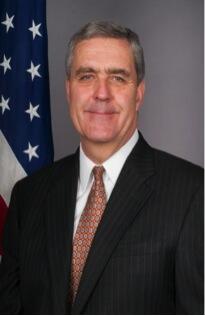The Security Conundrum: An Evening with Senator Mark Udall
Due to the large response we have received, registration for this event is for the wait list only.
This event will be livestreamed here when the event begins.
In an age of terrorism, where should a democratic society draw the line on government surveillance? Edward Snowden’s explosive disclosures about the National Security Agency’s intelligence-collection operations have ignited an intense debate about the appropriate balance between security and liberty in America. In a special series this year, nationally prominent experts will explore the critical issues raised by the NSA’s activities, including their impact on our security, privacy, and civil liberties. This timely series will address one of the most challenging questions the nation faces today as it tries to strike the right balance between safety and liberty.
The Security Conundrum will look behind and beyond the headlines, examining the history and implementation of the NSA operations, the legal questions generated by them, the media’s role in revealing them, and the responsibility of Congress to oversee them. It will also address the NSA’s uneasy and evolving relationship with Silicon Valley. Each session in the series is designed to explore these issues from a different vantage point. The guest speakers, in conversation with Stanford scholars, will probe the problems, explain the political, legal, and technological contours of the NSA actions, and outline ways to preserve the nation’s security without sacrificing our freedoms.
An Evening with Senator Mark Udall
Mark Udall was the senior US Senator from the state of Colorado from 2009–2015. During his tenure in the US Senate, Senator Udall held various national security committee assignments, both with the Senate Armed Services Committee and the Senate Select Committee on Intelligence. An active member of the Senate Intelligence Committee, Senator Udall gained notoriety for his vocal opposition to NSA surveillance programs in the wake of the Edward Snowden disclosures in June of 2013. However, as early as 2011, Senator Udall called on the Office of the Director of National Intelligence to declassify material related to US government surveillance. Following the Snowden revelations, Senator Udall advocated for adopting the recommendations from the President’s Review Group on Intelligence and Communications Technologies, as well as substantively reforming the NSA.
In a conversation with Amy Zegart, CISAC Co-Director and Davies Family Senior Fellow at the Hoover Institution, Senator Udall will provide a lawmaker’s perspective on the oversight of controversial NSA programs. He will discuss the divide between security and civil liberties, as well as his thoughts on reform of US intelligence collection activities.
Ticket information: Admission is free but advance registration is required. Doors open at 6:30 PM; no entry after 7:40 PM. Registration is limited to 1 ticket per person. A photo ID will be required at the door.
The Security Conundrum is co-sponsored by Stanford’s Freeman Spogli Institute for International Studies, the Center for International Security and Cooperation, the Hoover Institution, Stanford Continuing Studies, Stanford in Government, and the Stanford Law School.
CEMEX Auditorium
Knight Management Center
641 Knight Way, Stanford University
Amy Zegart
CISAC
Stanford University
Encina Hall, E216
Stanford, CA 94305-6165
Amy Zegart is a senior fellow at the Freeman Spogli Institute for International Studies, the Morris Arnold and Nona Jean Cox Senior Fellow at the Hoover Institution, and Professor of Political Science by courtesy at Stanford University. She is also a contributing writer at The Atlantic. The author of five books, Zegart is an internationally recognized expert in U.S. intelligence, emerging technologies, and global political risk management.
Her award-winning research includes the leading academic study of intelligence failures before 9/11 — Spying Blind: The CIA, the FBI, and the Origins of 9/11 (Princeton, 2007). Her most recent book is the bestseller Spies, Lies, and Algorithms: The History and Future of American Intelligence (Princeton, 2022), which was nominated by Princeton University Press for the Pulitzer Prize. She also co-authored Political Risk: How Businesses and Organizations Can Anticipate Global Insecurity, with Condoleezza Rice (Twelve, 2018) and co-edited Bytes, Bombs, and Spies: The Strategic Dimensions of Offensive Cyber Operations with Herbert Lin (Brookings, 2019). Her op-eds and essays have appeared in Foreign Affairs, Politico, the New York Times, Washington Post, and Wall Street Journal.
Zegart has advised senior officials about intelligence and foreign policy for more than two decades. She served on the National Security Council staff, as a presidential campaign foreign policy advisor, and has testified before the House and Senate Intelligence committees.
In addition to her research and teaching, she led Stanford’s Center for International Security and Cooperation, founded the Stanford Cyber Policy Program, and served as chief academic officer of the Hoover Institution. Before coming to Stanford, she was Professor of Public Policy at UCLA and a McKinsey & Company consultant.
She is the recipient of a Fullbright Fellowship, the American Political Science Association's Leonard D. White Dissertation Prize, and research grants from the Carnegie Corporation of New York, the Hewlett Foundation, the Smith Richardson Foundation, and the National Science Foundation.
A native of Louisville, Kentucky, Zegart received an AB in East Asian studies, magna cum laude, from Harvard and a PhD in political science from Stanford. She serves on the board of directors of the council on Foreign Relations, Kratos Defense & Secretary Solutions (KTOS), and the American Funds/Capital Group.



